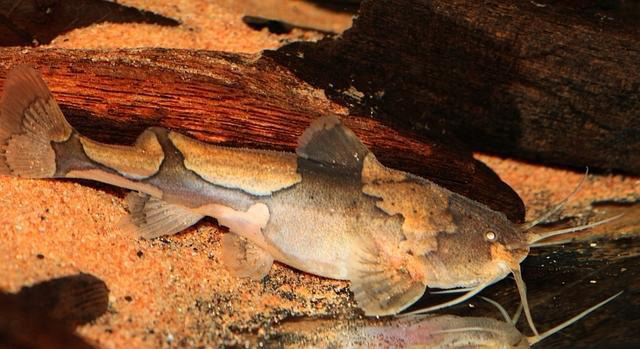| Akysidae (Stream catfishes), subfamily: Akysinae |
| 5.31 cm SL (male/unsexed) |
|
benthopelagic; freshwater |
| Asia: Known from the type locality in the Sittang River drainage, southern Myanmar (Ref. 56465). |
|
Vertebrae: 33-35. Akysis longifilis is a member of the A. variegatus species group and can be
distinguished from congeners in the group (except for A. brachybarbatus, A. fuliginatus, A. pictus, A. prashadi, A. variegatus, A. varius and A. vespa) in having a smooth (vs. serrated) posterior edge of the pectoral spine. It differs from A. brachybarbatus in having a narrower head (21.1-24.7% SL vs. 25.5-28.0) and a more slender caudal peduncle (5.6-7.2% SL vs. 7.9-8.1), and from A. fuliginatus in having a longer adipose-fin base (25.7-31.1% SL vs. 15.1-19.5), more slender body (9.7-13.6% SL vs. 14.1-16.6) and caudal peduncle (5.6-7.2% SL vs. 10.1-10.5), longer nasal and maxillary barbels (nasal barbel length 67.4-96.4% HL vs. 52.1-58.2; maxillary barbel length 123.2-159.6% HL vs.100.0-109.1), presence of light saddle-shaped spots on the body (vs. uniformly dark body), and a forked (vs. truncate) caudal fin. Akysis longifilis can be distinguished from A. pictus in having a more slender caudal peduncle (5.6-7.2% SL vs. 7.7-8.5), longer
adipose-fin base (25.7-31.1% SL vs. 22.0-23.6), and longer nasal and maxillary barbels (nasal barbel length 67.4-96.4% HL vs. 54.3-56.7; maxillary barbel length 123.2-159.6% HL vs. 95.7-128.8), and from A. prashadi in having a longer caudal peduncle (18.3-23.2% SL vs. 16.5-18.4). It differs from A. variegatus in having longer nasal and maxillary barbels (nasal barbel length 67.4-96.4% HL vs. 33.3-62.3; maxillary barbel length 123.2-159.6% HL vs. 78.3-114.8), from A. varius in having a forked (vs. truncate) caudal fin, and from A. vespa in having a longer adipose-fin base (25.7-31.1% SL vs. 17.6-21.1), more slender caudal peduncle (5.6-7.2% SL vs. 7.6-8.5), longer nasal and maxillary barbels (nasal barbel length 67.4-96.4% HL vs. 54.5-72.5; maxillary barbel length 123.2-159.6% HL vs. 89.0-98.2), and more vertebrae (33-35 vs. 31-32) (Ref. 56465). |
|
|
Not Evaluated (N.E.) Ref. (130435)
|
| harmless |
Source and more info: www.fishbase.org. For personal, classroom, and other internal use only. Not for publication.
